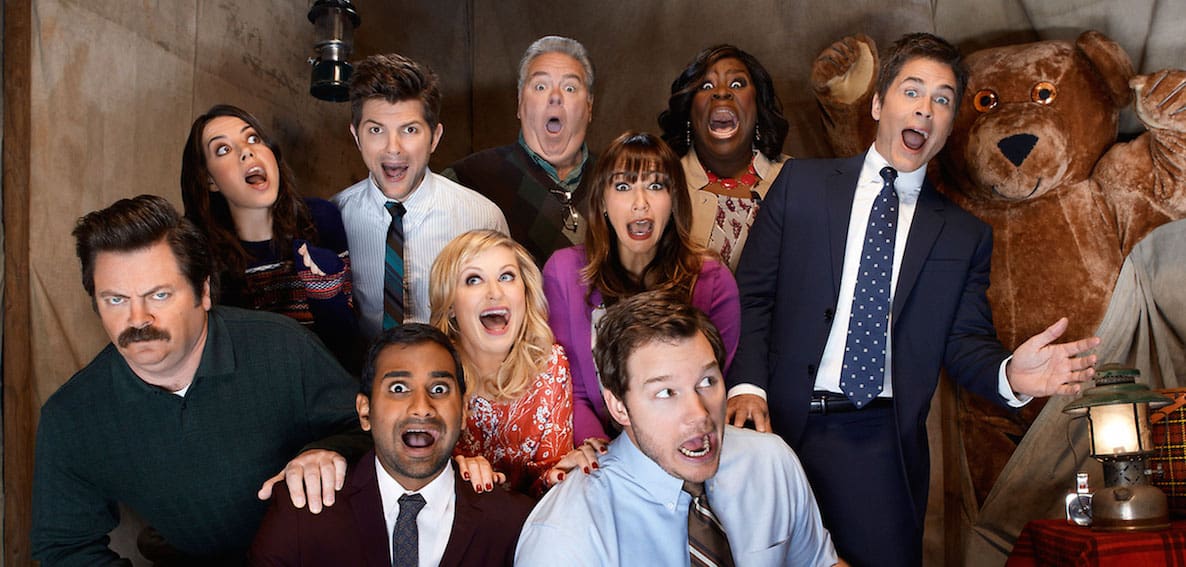
[Editor’s Note: This week marks the 10-year-anniversary of the debut of Parks and Recreation. To mark the occasion, we’re reposting this article from 2015 about what the show revealed about millennials.]
The Internet is already in mourning for the end of Parks and Recreation, which airs its last episode tonight.
With the show going off the air, TV is losing a gem of a comedy, but it’s also losing its best show about the millennial generation.
Even in an era that has brought viewers grittier offerings like Girls, meta-comedies like Community and smart, traditional sitcoms like New Girl, no show featured more commentary on the stereotypes, anxieties and challenges associated with being a millennial like Parks and Rec.
Out of Office
Parks and Recreation started as a sort of creative hat-tip to NBC’s sitcom mega-hit The Office in 2009 (it was created by Greg Daniels and Michael Schur, two of the main minds behind the American Office), but its first, six-episode season never really figured out what it wanted to be. The plot largely centered on how a passionate city official—Amy Poehler’s Leslie Knope—wanted to fill a giant pit on an empty lot that apparently posed a safety hazard to her beloved town of Pawnee, Indiana. It wasn’t exactly riveting television.
The show may have set out to use The Office’s faux-documentary style to create a political satire set in a small town, but as it moved into season two, the writers realized they had a much more compelling force on their hands: dynamite characters.
After settling into a new cast—dropping Paul Schneider’s underdeveloped Mark and adding Adam Scott and Rob Lowe—the show found a new formula. Instead of just relying on jokes about government and politics, Parks and Rec became a show about the relationship between a group of co-workers, each of whom possessed comically exaggerated personality quirks.
Few shows in television history have had lineups so strong. There was the hyper-libertarian lover of all things no-nonsense, Ron. The golden retriever like lovable man-child, Andy. The Mercedes-driving diva with endless ways to leave her lovers, Donna. The GQ-happy, wannabe entrepreneur, Tom. The high-strung state auditor with a bottomless love of geekdom, Ben. The snarky downer with a heart of gold-ish, April. Enthusiastic live wire, Chris. Straight-laced and long-suffering Anne, and of course, at the center of it all, Leslie: a 500 million-megawatt bulb of ambition with a fierce loyalty to her ideals and an unwavering commitment to her community.
And Jerry. Whatever he does.
Winning While You Work
As the just slightly absurd cast of characters became increasingly developed, an underlying theme became more apparent, even if it wasn’t the writers’ intention: Parks and Rec became a show about the millennial generation.
Hitting the workforce in the years after a major recession and strapped with record amounts of debt, millennials have become scrutinized for their ability (or inability) to adjust to the changing job market. But criticisms of the generation run deeper than just their economic influence. A Time cover story called the “Me Me Me Generation” “narcissistic, overconfident, entitled and lazy.” The generation has been unjustly criticized as being selfie-obsessed technology-addicts, fixated on pop culture while refusing to grow up and move out of their parents’ homes. Their wide-eyed passion for fixing social problems has been (at times unfairly) labeled slacktivism when world-changing campaigns (Kony 2012, hashtag campaigns, cause-linked consumerism), failed to change the world overnight.
Parks and Rec honed in on these ideas—and not just with their millennial characters.
Each of the characters on Parks and Rec came to embody one of the traits attached to millennial culture. The show, and its brilliant cast, not only helped make sense of the labels, but they shattered the stereotypes associated with them.
Instead of seeing traits like cynicism, immaturity, naïve ambition, celebrity infatuation, self-empowerment philosophy and materialism as negative labels that can be turned into punchlines and discarded just as easily, Parks and Rec showed how they could be redeemed.
April’s cold cynicism and too-cool-for-life attitude slowly gave way to real, authentic passion when she found a cause she believed in (helping animals). Andy’s Peter Pan lifestyle and fixation on not growing up became the creative fuel he needed to channel his creative talent as children’s entertainer Johnny Karate (along with the support of his wife).
Leslie’s

unwavering belief that she can change the world is frequently framed as hopelessly naïve (she hangs

pictures of herself next to famous female world leaders), but she is unflinching in her mission to do it anyway. As the series went on, she went from filling empty pits to being courted for a job at the federal government.
Tom’s unending list of terrible, so-in-they’re-out business ideas proved to just be the first steps in a career as an actual successful entrepreneur with the help of patient, savvy friends like Donna.
Chris’ self-belief mantras ended up not being rooted in narcissism, but in an emotional fragility that led him to be reliant on real community (thanks, of course, to Dr. Richard Nygard).
Ben’s constant anxiety, centered on balancing financial security and doing a job he actually believed in (even if it was risky), was the catalyst for helping many of his friends in their own dreams.
And, perhaps the show’s most enduring character, the emotionally detached, alpha male Ron Swanson, didn’t turn out to just be some one-note, anti-social, anti-government idealist. In reality, he’s so devoted to the principle of authenticity and maintaining convictions that all of his relationships are closely guarded. He makes his own furniture by hand—not simply because he likes woodworking—but because he knows the things he make will be solid. That’s his core value, and it bleeds into his beliefs, his ethics and even his friendships. It may be hard to win Ron Swanson over but, once you do, you’ve got a friend for life.
Parks and Rec is about deeply, albeit hilariously flawed people relying on community to bring out their best selves. It’s about turning personal quirks into personal assets with the help of people who care about you. It tackled the same labels, challenges and flaws often assigned to millennials, but instead of being biting or mean-spirited, it was redemptive.
Parks and Rec set out to be a parody of a broken political system, but it became about show about broken people working together to become better people. It started as a show about government, but it became a show about community. It became a show about what it means to be ourselves—and what it means to shed the labels associated with the generation it never stopped believing in.






















